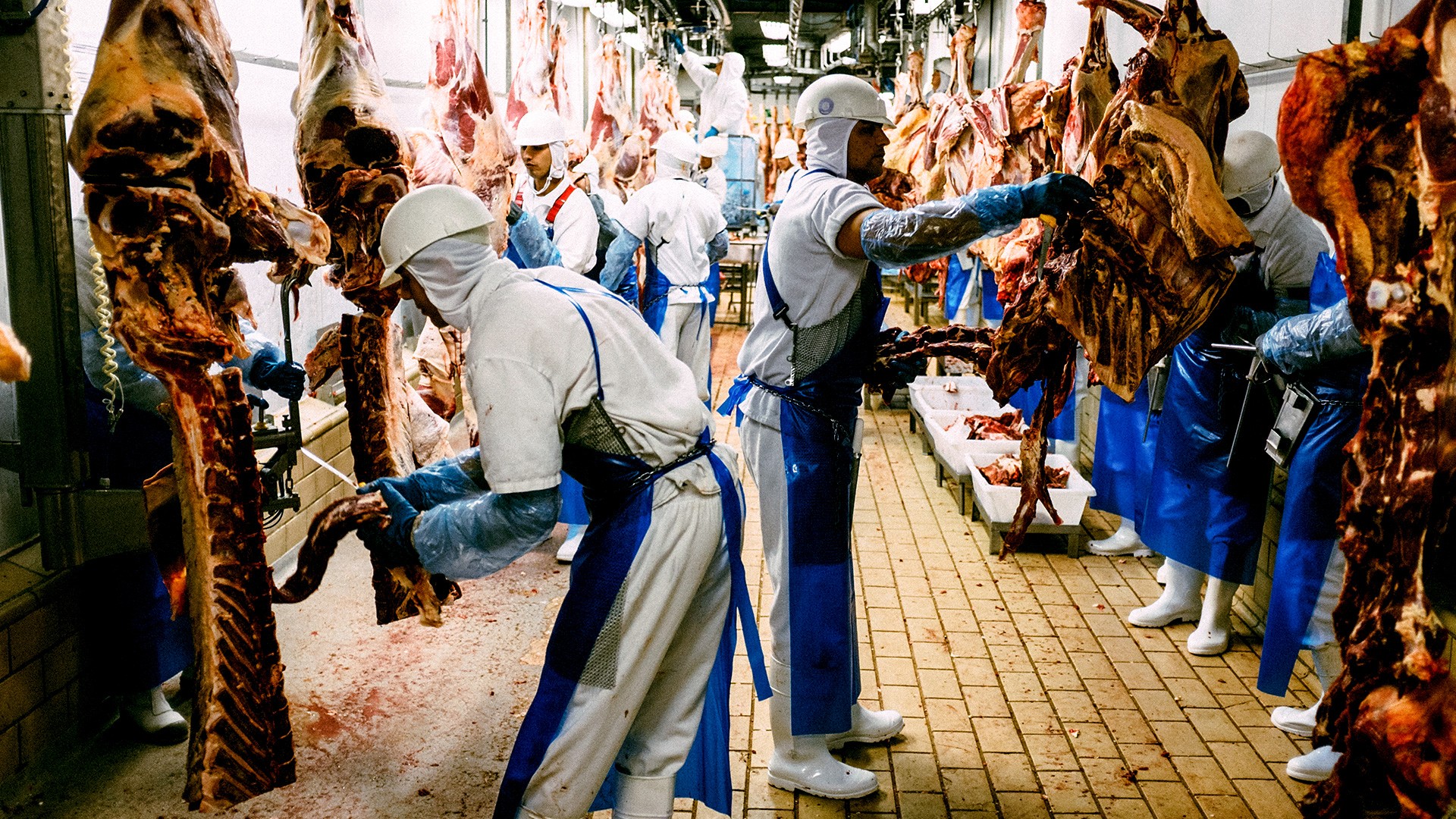As it went into effect with the turn of the new year, a ban on certain methods of animal slaughter in the Belgian region of Flanders is raising concerns over religious freedom in Belgium.Because the ban ends the religious exemptions that allow the slaughter of animals without the use of stunning measures first, it effectively curtails the current methods of kosher and halal animal slaughter. The Belgian region of Wallonia will enact a similar ban on September 1, 2019, and animal welfare activists hope to see the ban extend to the region of Brussels as well.
Advertisement
While Belgian animal welfare activists are applauding the ban’s effects on animals—for whom they say slaughter will become more humane—Belgium’s Jewish and Muslim communities worry that the infringement on their slaughtering practices is part of a larger trend towards anti-religious sentiment. However, for Muslim and Jewish communities, religious doctrines specify terms for what slaughter practices qualify as halal and kosher meat. Until recently, Belgium allowed religious exceptions so that halal and kosher meat production could continue as dictated by religious rules. Now, first in Flanders and then in Wallonia, Belgian legislators are walking back those exemptions, a decision that’s prompted public outcry in Europe.
However, for Muslim and Jewish communities, religious doctrines specify terms for what slaughter practices qualify as halal and kosher meat. Until recently, Belgium allowed religious exceptions so that halal and kosher meat production could continue as dictated by religious rules. Now, first in Flanders and then in Wallonia, Belgian legislators are walking back those exemptions, a decision that’s prompted public outcry in Europe.
In statements to MUNCHIES, Jewish leaders shared fears that the ban will make an unwelcome environment for Jews in Belgium. In a report by the New York Times, a Muslim leader also said that the ban was enacted against the community’s advice.The ban focuses on the practice of stunning, a process that renders the animal unconscious before it’s killed. In cows, the act is typically performed using captive bolt stunning that either penetrates the brain or strikes the forehead with force, preventing the animal from being aware when it’s slaughtered; in chickens, electric water bath stunning is typical. As a result of legislation, stunning animals before slaughter has become the norm in many European countries.

Advertisement
In order for meat to be considered halal, or legal and permissible according to the Qur’an, there are many specifications. Similarly, in the Jewish faith, shechita is the only permissible method for producing kosher meat and poultry. In both systems, animals intended for food must be healthy and unharmed at the time of slaughter—the use of stunning, to members of both communities, violates those rules.
According to the group ShechitaUK, stunning can not only injure but even kill an animal before slaughter, deeming it unfit for consumption. They add that shechita makes an animal instantly lose consciousness, which makes stunning unnecessary. According to the Halal Monitoring Committee, stunning can cause not only injury but unnecessary animal suffering, and they point out a lack of scientific evidence that stunning successfully prevents animals from feeling pain.As a result, these religious groups have had growing tension with animal welfare organizations over their slaughter practices. According to activists like Ann De Greef, director of the Belgian animal welfare group GAIA, the answer is simply to make stunning admissible by religious doctrines. “It’s not a ban on religious slaughter. In many countries where there is a ban on unstunned slaughter, there is halal meat,” De Greef told MUNCHIES. “We don’t make animals suffer when there is an alternative… They have to adapt themselves as we have to adapt ourselves.”
Advertisement
But according to scholars of halal, accepting stunning into religious doctrine isn’t as easy as De Greef might suggest. According to Febe Armanios and Bogac Ergene, professors of history at Middlebury College and the University of Vermont respectively and co-authors of the book Halal Food: A History, because pre-slaughter stunning is a contemporary issue, it’s not directly addressed in the traditional Islamic rules on halal slaughter. That’s why “there is no set, universally agreed-upon juristic position on the status of pre-slaughter stunning,” they told MUNCHIES in an email.While the Muslim community holds the universal position that animals must be healthy and unharmed before slaughter, opinions diverge on whether non-penetrative stunning practices harm the animal or not, said Armanios and Ergene.
“…There are disagreements among Muslims on the status of pre-slaughter stunning by methods that render animals temporarily unconscious,” they wrote. “Some agree on the legality of this procedure, and some don’t. Those who don’t argue that these methods are at best unnecessary and, at worst, harmful to animals.”According to Armanios and Ergene, Muslim leaders are so torn on the idea that two of the United Kingdom’s leading halal certifying agencies diverge in position: The Halal Food Authority holds that pre-slaughter stunning is acceptable as long the animal remains alive, while the Halal Monitoring Committee does not allow stunning in any form.
Advertisement
Photo: Getty Images/AndiGrieger
While religious groups remain divided within themselves on the practice of stunning, they share sentiments that the legislation is not only a discriminatory act, but a threat to religious freedom.
According to Dr. Viatcheslav Moshe Kantor, president of the European Jewish Congress, the ban—which he called “highly unnecessary and insensitive”—threatens the daily practices of Jewish life.“The ban on kosher slaughter is a massive blow to our communities, reeling from incessant attacks, heightened security and anti-Semitism,” he said in a statement to MUNCHIES. “Those who place a ban on Jewish customs severely curtail Jewish life and send a message, intentional or not, that Jews are less than welcome.”In a statement shared with MUNCHIES, Chief Rabbi Goldschmidt, president of the Conference of European Rabbis, also denounced the anti-religious sentiment enacted by the ban. “That provinces within Belgium, the law making capital of Europe, have passed this type of anti-religious measure is an affront to the European values we all hold so dear. Time and again, the Jewish community is told by senior EU officials that there is no Europe without the Jews,” he said. “These bans undermine those statements and put Jewish life at risk… Words are weak when actions hurt.”
In the Times’s estimation, the legislation in Flanders and Wallonia has ties to the far right: The paper notes that right-wing politicians, especially in countries with growing Muslim populations, have been pushing religious slaughter as a xenophobic talking point.
Advertisement

But while De Greef is quick to toss out the rumblings of discrimination behind the ban, reports suggest that Belgium has, over the past few years, become a less hospitable climate for Muslims and Jews.According to a 2017 report on international religious freedom put together by the US State Department, the Belgian government has increased efforts to “curb radical Islam” following terror attacks in 2016. The report cited examples including a ban on headscarves for women in public sector jobs, the upholding of a ban on full-face veils in public, and an increase in religious-based workplace discrimination complaints. Between 2015 and 2016, anti-Semitic acts and threats in Belgium nearly doubled.According to Armanios and Ergene, this merging of animal rights and xenophobic ideas should come as no surprise, as anxieties about Muslims have historically played out through discussions of ritual slaughter. “In many Western countries, popular opinions of religious slaughter practices often reflect anxieties about Muslims’ cultural integration and their ability to appropriate what many consider to be modern and Western values,” they wrote, adding that since the early 20th century, animal rights have sometimes been discussed in the context of “growing anti-minority attitudes.”Armanios and Ergene added, “In these ways, the debate over halal slaughter can indeed be seen as indicative of a larger culture clash in Europe, perhaps partially akin to recent attempts at banning clothing items such as head scarves and burkinis.”According to the Times, leaders of Jewish and Muslim groups have filed lawsuits in Belgium’s Constitutional Court, hoping to repeal the ban. However, the battle over stunning has a long way to go: When asked whether she hopes the ban will extend to the Belgium’s capital region of Brussels, De Greef said, “Oh yes, we will not rest until that happens.”
